When:
July 14 – 21
Where:
Nichols Concert Hall
1490 Chicago Avenue
Evanston
Tickets:
$30 adults (with senior and student discounts)
Founded in 1988 by Claire Aebersold and Ralph Neiweem, the Music Institute of Chicago’s Chicago Duo Piano Festival has as its mission to foster a deeper interest in the repertoire, performance, and teaching of music for piano, four hands and two pianos, in a fun and supportive atmosphere. The Festival presents an annual summer festival and winter mini-fest, youth and adult competitions, master classes, and concerts featuring national and international guest piano duos. The festival has hosted many of the world’s best-known piano duos, including the Paratore brothers, Hans-Peter and Volker Stenzl, Tal and Groethuysen, the Contiguglia brothers, and Anderson and Roe.
This year’s festival takes place July 14–21, including two public performances at Nichols Concert Hall that pay tribute to American composer George Crumb on the occasion of his 90th birthday. A Picture This Post (PTP ) conversation with Festival co-founder Ralph Neiweem (RN) follows.
(PTP) What first attracted you to the piano as an instrument of study and performance?
(RN) The seemingly endless possibilities for musical expression; the seemingly endless number and quality of great masterworks written for this, the most personal of all instruments.
When did you discover your particular passion for duo piano? Can you explain what that means for those unaware of the various configurations?
I fell in love with the sound of the piano duo from the time I was a kid listening to WFMT radio growing up in Chicago. They would often play old Vronsky and Babin recordings of Brahms and Rachmaninoff and I was hooked. But my real passion was kindled after I met Claire Aebersold, my wife and piano duo partner, and we discovered how much wonderful music Schubert wrote for piano, four hands; Schubert was our favorite composer and we were in heaven!
Duo Piano refers to music written for two players at either one or two pianos. We refer to Piano I and Piano II in music for two pianos. At one piano, the music is referred to as piano, four hands or piano duet. Pianists playing at one piano are often known as duettists, and their parts are referred to as primo (top part of the piano) and secondo (bottom part of the piano). There is also a large repertoire of pieces written for more than two players at two pianos (typically a pair of duettists) and even music for three or four pianists at one piano!
What satisfaction do you get as a musical educator?
A very great satisfaction equal to, but very different from, performing. To be able to mentor young talented musicians is a great privilege and responsibility, but even greater is the knowledge that you have contributed to the musical culture of our world by helping students of all backgrounds, whether they will be performers or not, discover themselves, and experience invaluable personal growth through this great art form.
In what ways does instruction in duo piano add to students' educational experience?
For pianists, Claire and I feel that studying the duo repertoire is essential for the simple reason that one learns the most about the instrument when grappling with its problems with a partner. We learn about balance of sound, correctness and flexibility of rhythm, precision in the use of the pedal, among many other things. Mostly, it’s so much fun and a great gateway into playing chamber music.
Is participation in duo piano works a standard part of the piano instruction program at the Music Institute? Is this typical or unique vis a vis piano instruction in the U.S.? the world?
It’s an option that Claire and I have developed at the Music Institute, but a popular elective. Our program is rather unique in its scope and focus and not really typical of other schools. Through Chicago Duo Piano Festival, we offer performance opportunities for students and faculty, competitions in piano duo, and a bonding camp experience in the summer.
Are duo piano works gaining in popularity? If so, why do you think that is? If not, why do you think more of a spotlight on these types of performances and compositions would be of interest?
Piano duo performance and composition seem to have gained in public interest since the 1970s. Before then, piano duo performance was more of an area for specialty teams, i.e., Vronsky and Babin, Gold and Fizdale, to name a couple. The scene for this type of duo (my wife and I included) is still healthy, but now many fine piano soloists pair up regularly with duo piano partners and play duo concerts. Martha Argerich, for instance, regularly performs duo concerts with a variety of her piano pals.
Our Chicago Duo Piano Festival, and the few others like it, regularly commission new works, including Symmetries by Joseph Turrin. We see this as a big part of our mission. We even partnered with the Dranoff Two Piano Festival in Miami on a joint commission for a new two-piano piece by Robert Chumbley last year, Cries and Whispers, a fascinating musical exploration of the process of Beethoven’s deafness. So, yes, I am happy to say that our niche genre of duo piano is quite healthy. I hope we have contributed a small part to this! I would only add that composers seem more interested in writing for two pianos than piano duet these days, a void we would like to see filled. To that end, several years ago we commissioned, and recorded, a wonderful four-hand Sonata by Patrick Byers.
Why did you and your wife Claire decide to create the Chicago Duo Piano Festival? Did you feel as though you were filling a gap in the musical performance and education sphere?
When we started out, our mission was strictly educational: to provide students with an opportunity to discover the wonderful world of piano duo. This is still there, but throughout the years, we have been able to add a concert series, competitions, and our commissioning program.
This year you are spotlighting George Crumb. Would you tell us more about him and why you are focusing on his work this year?
George Crumb is celebrating his 90th birthday this year, and among his important works is the series known as Makrokosmos for amplified pianos and sometimes percussion. These have become staples in the repertoire for piano duo.
Crumb has created a whole new sound language, and we are fortunate to have many faculty members at the Music Institute who play his music and have made these performances possible. Those attending these concerts will have a feast for eyes and ears, as Crumb's work is rather dramatic in that it requires performers to play their instruments in unconventional ways to create a whole new sound world.
A schedule and ticket information are available at the Music Institute website.
Photos courtesy of Music Institute Chicago unless otherwise indicated.

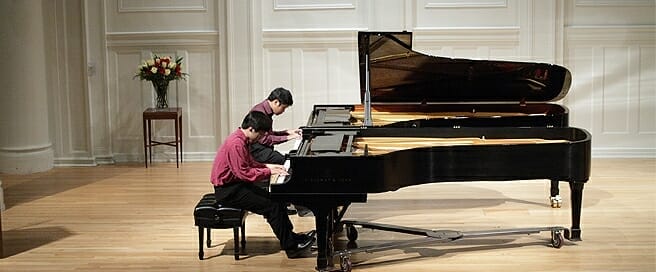
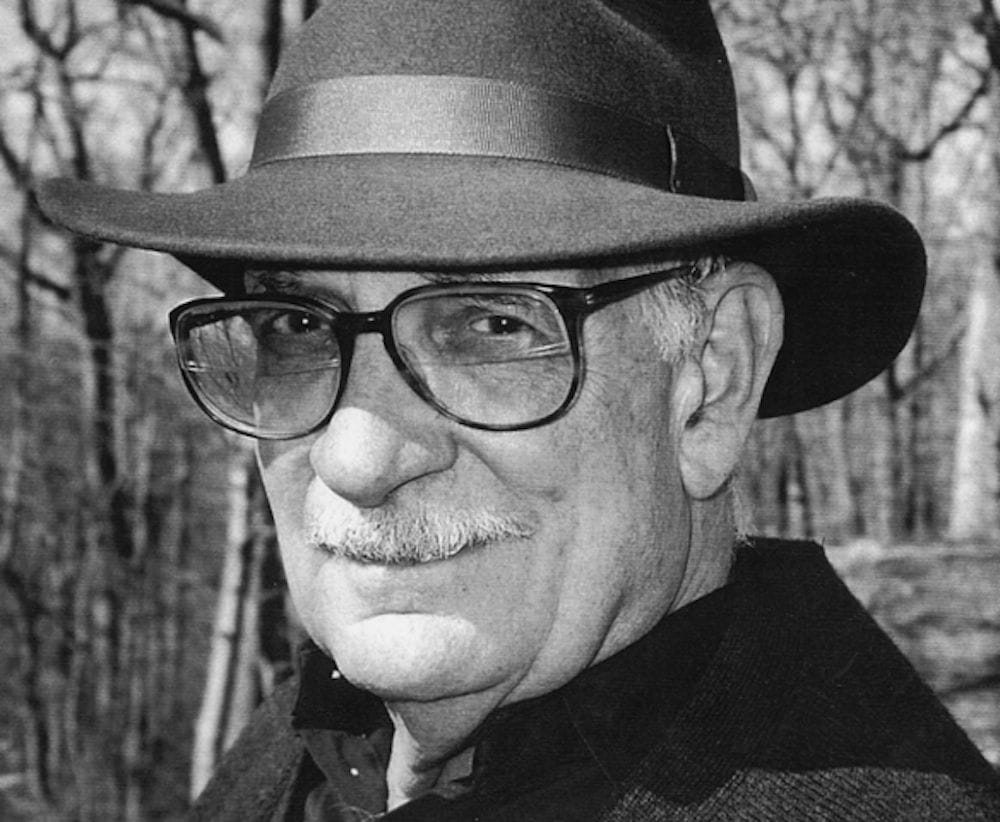
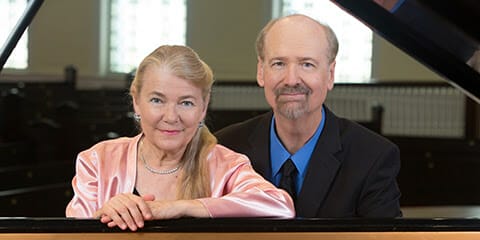
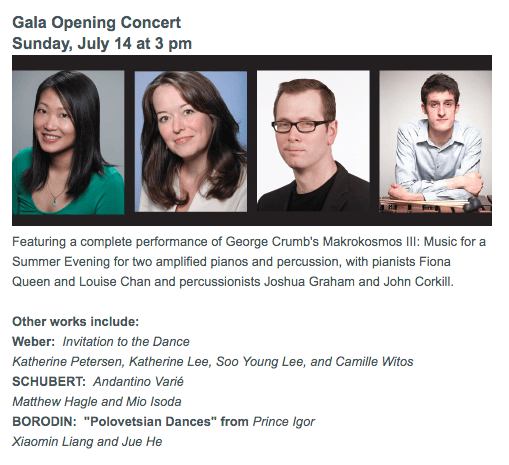
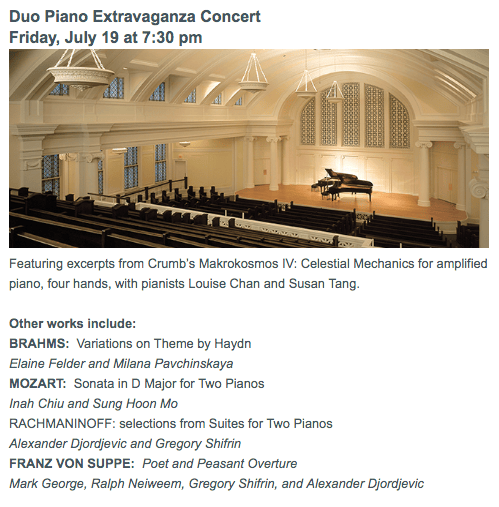

Thanks for the opportunity to share our passion for the piano duo!
Claire Aebersold and Ralph Neiweem